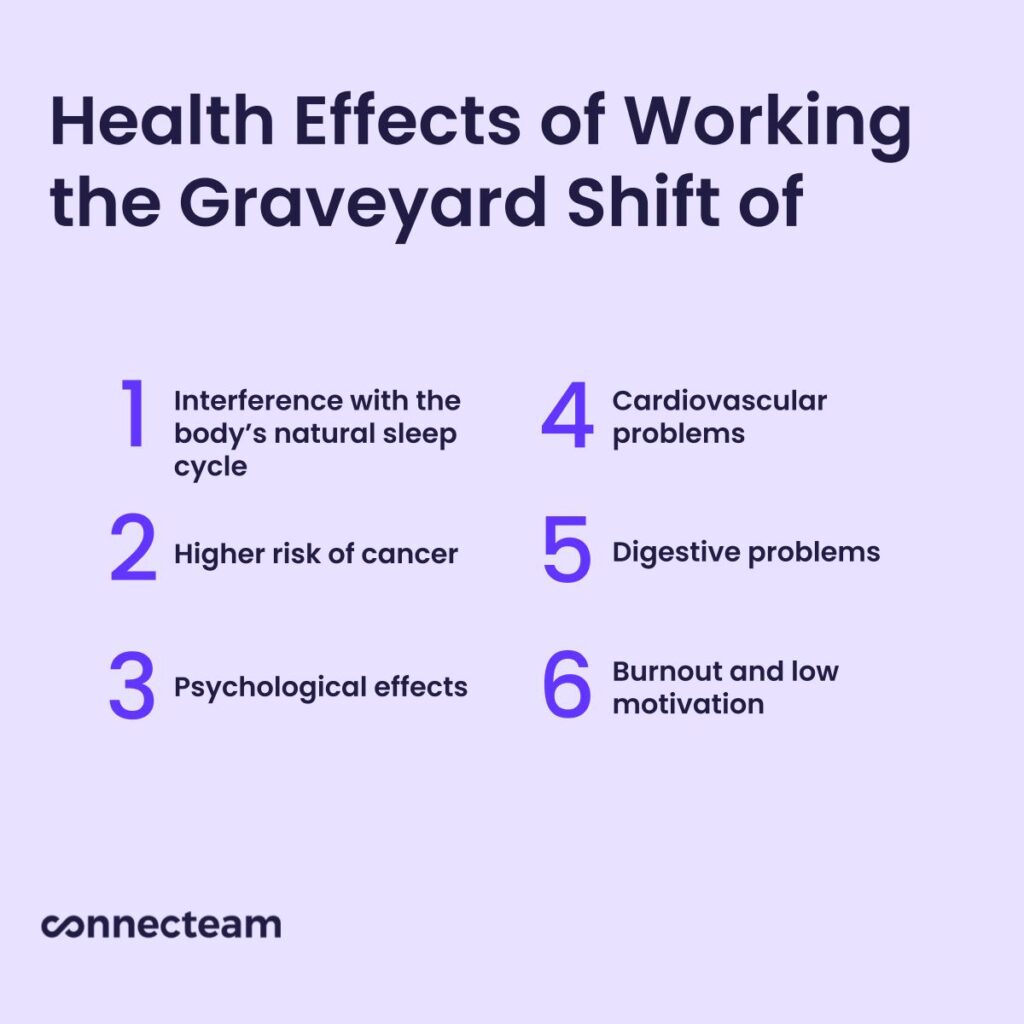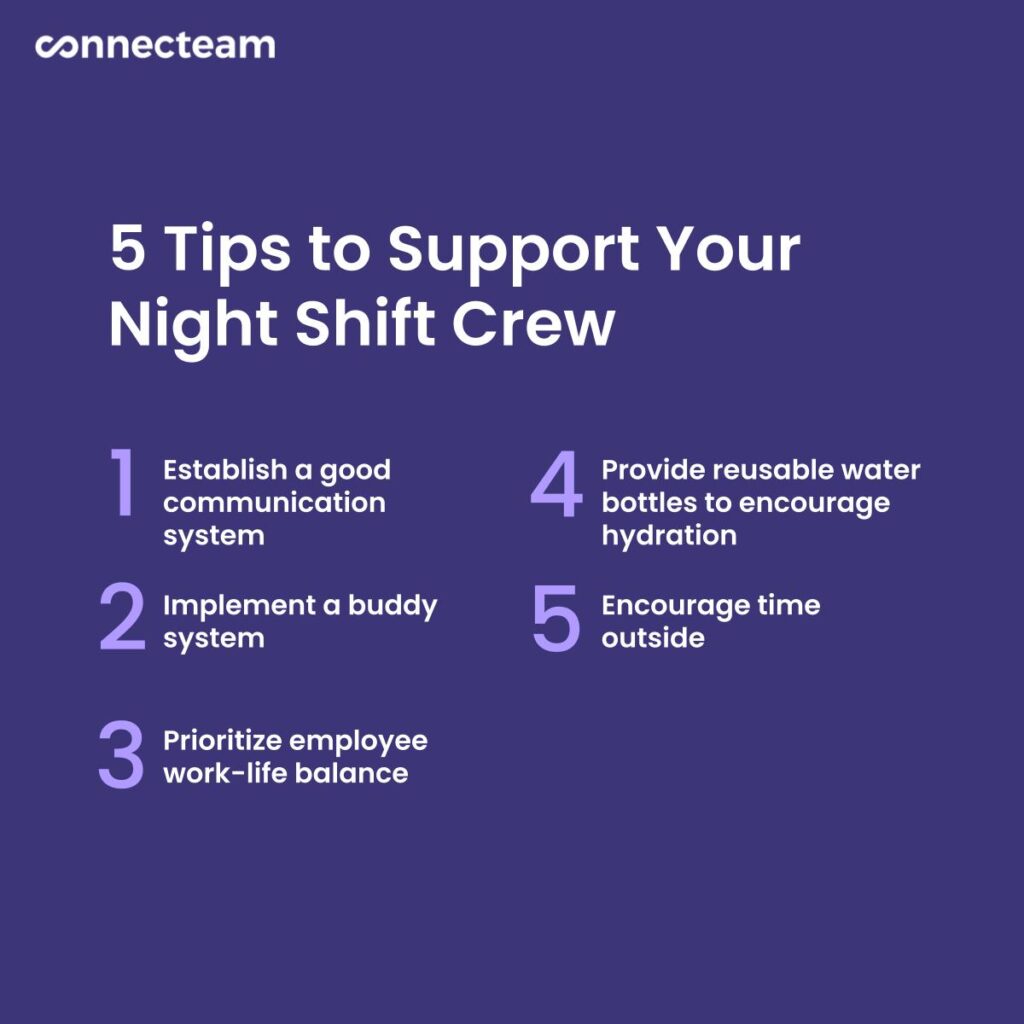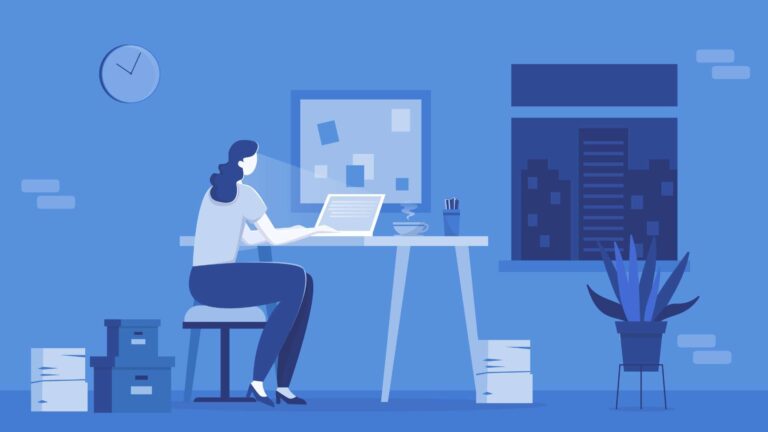Working the night shift can have negative health effects on your employees. Learn 7 of the most common health issues they may face and strategies you can use to help them combat these problems.
Shift work, particularly the night shift, is commonly known as the most difficult type of work schedule because it can negatively impact employees’ mental and physical health.
Our bodies thrive on routine, and a key part of that routine is a natural sleep cycle regulated by sunlight. Night shifts throw a wrench into this delicate balance, potentially leading to a cascade of health problems.
In this article, I’ll discuss some of the most common issues associated with working the graveyard shift and offer tips on how you can support your employees to mitigate some of the harmful effects.
Health Effects of Working the Graveyard Shift
While the night shift might be necessary to keep your business running, employees who work these shifts tend to have higher rates of absenteeism and take more sick days due to the negative health effects of working through the night.
To combat this, it’s important to be aware of how working the graveyard shift can impact your staff. Let’s review some specific health concerns and strategies you can use to reduce their effects.

Interference with the body’s natural sleep cycle
Our bodies have a built-in 24-hour internal clock called the circadian rhythm. This rhythm regulates things like sleepiness, hormone production, and even digestion. It’s naturally set for us to be awake and alert during the day (when there’s sunlight) and to wind down and sleep at night (when it’s dark).
Night shifts disrupt this delicate balance and can cause shift work disorder, also known as shift work sleep disorder. This disorder can cause insomnia when workers attempt to sleep during the day and excessive sleepiness while working, among other problems.
How to support your staff
Encourage employees to maintain a regular sleep schedule, even on their days off. While sleeping during the day can be difficult, you can provide items like eye masks, blackout curtains, and earplugs to block out light and sound.
Provide your staff with resources on the importance of good sleep and strategies to help them get enough rest during the day so they’re alert for their shifts.
📚 This Might Interest You:
Read more about the pros and cons of different types of night shift schedules especially regarding the sleep of your employees.
Higher risk of cancer
Studies show that long-term night work can lead to an increased risk of breast cancer, digestive cancer, and skin cancer. Women who’ve worked the night shift for several years are actually 19% more likely to be diagnosed with one of several cancers. Research has also found that the risk of breast cancer in women increases by 3.3% for every five years of night work.
How to support your staff
Encourage employees to get regular cancer screenings, such as mammograms, skin checks, and colonoscopies. Provide information about available health benefits from the company’s health insurance or employee wellness program and help facilitate access to these services.
Psychological effects
Sleep deprivation causes more than just physical ailments; it can have psychological effects, too. Depression, anxiety, irritability, mood swings, and decreased cognitive function are all associated with working the night shift.
According to a recent study, employees with a higher risk for developing shift work disorder experienced more depression, anxiety, and stress than low-risk employees.
How to support your staff
Maintain open communication with your night-shift staff. Check in with them regularly and let them know you’re there for them if they need emotional support. As part of your company’s employee wellness program, you can also offer free or discounted access to therapists and psychiatrists.
🧠 Did You Know?
Several websites offer online mental health services, where individuals can see licensed counselors virtually. These resources make mental health care more available and affordable.
Betterhelp and Talkspace are both popular options, and you may want to consider partnering with them to provide employees with accessible mental health services.
Cardiovascular problems
Studies show that night workers are more likely to experience heart problems, like high blood pressure, enlarged hearts, and even heart attacks. This is due to the body’s internal battle between its natural sleep-wake cycle and the demands of the night shift schedule.
The disruption of the natural sleep cycle reduces melatonin production, which can cause the body to release more stress hormones like cortisol. Chronically elevated cortisol can contribute to high blood pressure, inflammation, and even changes in how your body uses cholesterol—all factors that can increase the risk of heart disease.
How to support your staff
Make sure you offer a health insurance plan that specifically covers cardiovascular health services. Plans should include preventive care, routine screenings, cardiologist visits, and treatment for heart-related conditions.
💡 Pro Tip:
Create a group chat for all your nighttime staff using Connecteam’s team instant messaging feature to maintain communication with your team, even if employees aren’t in the same locations. You can share health tips and words of encouragement and enable your employees to chat and support each other right from their mobile devices.
Digestive problems
Compared with day workers, night shift workers more frequently experience stomach issues, such as abdominal pain, diarrhea, constipation, nausea, change in appetite, and indigestion.
There are two main reasons for this: one, it’s unfortunately another side effect of disturbed sleep. Two, employees working the graveyard shift may not eat regular meals during the day and during their shifts. Irregular working hours may make them more likely to eat quick snacks instead of well-rounded meals.
How to support your staff
Schedule regular meal breaks during night shifts and provide nutrient-dense meal and snack options. If your night shift staff work in multiple locations, you can give them meal vouchers, gift cards, or monthly stipends to buy themselves food for their shifts.
You can also provide resources on maintaining a healthy eating schedule. Consider holding in-person events with a nutrition coach to speak to your team.
Or, you can share information virtually with a recorded video. Let your team know about the importance of the recorded session and post it on your company updates feed so everyone’s aware. You can also store additional resources in your company knowledge base.
Burnout and low motivation
Only 15% of employees report feeling motivated, and the numbers can be even lower among your night shift team. Lack of quality sleep can zap energy levels and make it harder to focus, contributing to feelings of burnout and low motivation. This can also be a risk factor for depression.
Night shift workers might struggle to stay engaged and productive during their shifts, impacting their well-being and potentially the team’s overall performance.
How to support your staff
When employees feel motivated, their work performance increases by 20%. Here are a few ways to boost team motivation and combat burnout:
- Give employees some control over their work. Let them make decisions, solve problems, and own their projects so they feel a sense of responsibility and ownership.
- Provide incentives, such as gifts, bonuses, and gift cards.
- Make employees feel valued by publicly acknowledging their contributions to the team using Connecteam’s company updates feature. Customize and share digital badges of recognition, send messages of encouragement, and employees can comment, like, and respond with emojis to boost engagement.
- If possible, organize team-building events, casual get-togethers, or even small celebrations to create community.
- Communicate with your team and help them see the bigger picture and how their role contributes to the company’s success.
Physical injury
Night shifts are associated with a higher risk of injuries. This can be due to several factors, including fatigue from disrupted sleep patterns, lower alertness levels during nighttime hours, and potentially reduced staffing compared to daytime shifts.
With less supervision and a less lit environment, the risk of accidents and mistakes can increase.
How to support your staff
- Ensure proper lighting at job sites to minimize fatigue and make sure employees can see what they’re doing while working.
- Plan employee breaks throughout the night to combat fatigue.
- Conduct regular safety trainings to reinforce existing safety protocols and best practices to prevent accidents. If you manage a construction team, for example, you could conduct a training session on fall prevention to educate crew members on common hazards at nighttime. This might include how to properly use fall protection equipment like harnesses and lifelines and workplace safety tips to minimize fall risks on job sites.
💡 Pro Tip:
Create customized, interactive training courses and deliver them to your team using employee training software, like Connecteam. Staff can complete training right from their mobile devices, and you can monitor their progress along the way.
5 More Tips to Support Your Night Shift Crew

Establish a good communication system
Graveyard shift workers can often feel disconnected from their day-shift coworkers. Clashing sleep schedules and limited opportunities for casual interaction can create a social barrier. This disconnect can lead to feelings of isolation and make effective communication more difficult, making collaboration and team engagement more challenging.
However, you can use an employee management app, like Connecteam, to help your night shift employees stay connected and engaged.
Connecteam comes with multiple communication channels to keep all your staff aligned and recognition and rewards features to boost employee appreciation and engagement.
Key features include:
- Online team chat, including 1:1 and group chats
- Searchable company employee directory
- Knowledge base to store important safety and training information
- Interactive employee newsfeed for important company updates and announcements
- Recognition badges to highlight employee milestones and show appreciation
- Rewards system that enables you to send employees digital points that they can later redeem for gift cards
📚 This Might Interest You:
Check out our roundup of the best team communication apps of 2025.
Implement a buddy system
Pair up night shift workers to look out for each other during their shifts. This not only encourages team bonding but also helps avoid unsafe working conditions.
Adrian Wade, Head of Supply Chain at BlueSky Solutions, says:
“A buddy system can also help alleviate the impact of working the night shift. Buddies can look out for each other, watch for signs of sleep deprivation and fatigue, and help motivate each other. They can also act as a warning for managers if someone is too fatigued to work.”
Prioritize employee work-life balance
Time away from work is crucial for your staff’s physical and mental health, and it’s important that employees know that you genuinely care about their work-life balance. A few ways to do this are to respect their day-off preferences, offer flexible scheduling to accommodate sleep routines, conduct regular check-ins with staff, arrange team-building activities, and avoid calling or texting staff on their days off.
You can use a time off management app so employees can submit time off requests directly from their mobile devices. The app will also flag you automatically if you accidentally schedule someone who’s on vacation.
Nathan Willard, President of HOODZ, says:
“Night shift workers want the same things that all workers are looking for in a work environment. Additionally, it’s important for their leadership to understand that third shift workers, in particular, may have other commitments in their daily lives that make the late work hours more appealing. Understanding why they want to work for you during that time will give you a better connection with your team.”
Provide reusable water bottles to encourage hydration
Shift workers spend a lot of time on their feet, which leads to dehydration. They may turn to coffee or energy drinks to stay awake, which can be dehydrating and cause their energy levels to crash.
Staying hydrated is actually crucial to staying alert and awake and even helps regulate bodily processes.
Providing all your staff with a reusable water bottle is a great way to encourage everyone to drink more water. You can even brand it with your company logo for some free marketing.
Encourage time outside
Night shift workers are prone to vitamin D deficiencies because they sleep during the day and spend less time in the sun. This can have negative consequences on bone health, the immune system, and on their mental health.
Actively encourage your night shift team to spend at least an hour outside before coming into work. You can work together with your staff to structure their sleep schedules so they can get some sunshine before coming in for their shifts.
If your employees work in the same area, you could even give your night shift crew the day off once in a while and arrange an outdoor team activity, such as hiking or a day by the nearest body of water.
Are there Benefits of Working the Night Shift?
I’ve presented some pretty negative health effects of working night shifts, but the graveyard shift does have some benefits for employees, such as:
- Fewer crowds and less traffic: Night shifts often mean working in a quieter environment with fewer colleagues or customers around. This can be ideal for people who prefer a calmer work atmosphere and can improve focus for tasks requiring concentration. Commuting during off-peak hours can also mean less traffic.
- Higher pay: Many companies offer premium pay or shift differentials for night shifts to incentivize employees to take on these less desirable hours.
- More flexible schedules: Night shifts can sometimes offer more flexibility in scheduling, particularly when compared to traditional 9-to-5 jobs. This can be appealing for people who have other commitments during the day.
- Increased autonomy: Night shift teams are usually smaller, leading to potentially less supervision and more autonomy in completing tasks. This can be good for workers who prefer working more independently and enjoy taking ownership of their work.
- Less competition: In certain fields, night shift positions might have less competition compared to day shift roles, which can be advantageous for someone looking to break into a particular industry or secure a job more quickly.
FAQs
Am I required to pay my night shift workers more?
In the US, employers are not required to pay employees extra for the night shift. However, the Fair Labor Standards Act (FLSA) does require that covered, nonexempt workers be paid no less than time and a half the employee’s regular rate for time worked over 40 hours in a workweek.
Is it unhealthy to work the night shift?
While there are negative health effects of working the night shift, employees and employers can work together to combat them to the best of their abilities.
One of the most important ways to support your night shift crew is by encouraging them to get quality sleep during the daytime. Good sleep is one of the best ways to curb the negative health effects of working the night shift.
Make sure staff have eye masks or blackout curtains in their homes to mimic nighttime so they can show up to work rested and ready to work.
Should night shift employees work 8-hour shifts?
It’s up to you how you divide your shifts and create employee schedules. The specific demands of the job and the level of physical or mental exertion required may affect how long shift are.
It’s certainly acceptable to schedule night shift workers for 8-hour shifts like any other shift. Depending on the workload, using split shifts to break the night shift into shorter segments with a break in between might be a better option.


